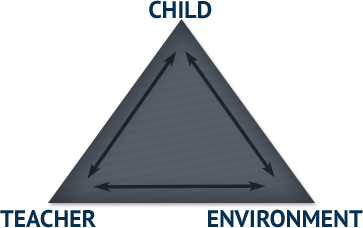The Montessori Philosophy
In 1907, Dr. Maria Montessori developed a child-centered educational approach based on her scientific observations of children from birth to adulthood. Montessori educators believe all children have a natural hunger for knowledge and are capable of initiating their own learning in the right, supportive environment. The approach values the development of the whole child—physical, social, emotional, and cognitive.
The Hallmarks of Montessori
There are several marks of an authentic Montessori program, including:
- Multi-age groupings that foster peer learning. Younger children learn from older ones, and older children reinforce their learning by teaching concepts they’ve mastered.
- Uninterrupted blocks of work time
- Guided work activity choices
- Meticulously arranged, specially designed learning materials
- An aesthetically pleasing learning environment
Montessori Learning
 In an authentic Montessori program, the teacher, child, and environment create a learning triangle.
In an authentic Montessori program, the teacher, child, and environment create a learning triangle.
The teacher sets up the classroom in a way that encourages each child to exercise his or her independence within a set of boundaries. Classrooms are orderly and calm, giving the children the opportunity to concentrate and go about their work independently. The teacher provides guidance as support as the child works at his or her own pace.
